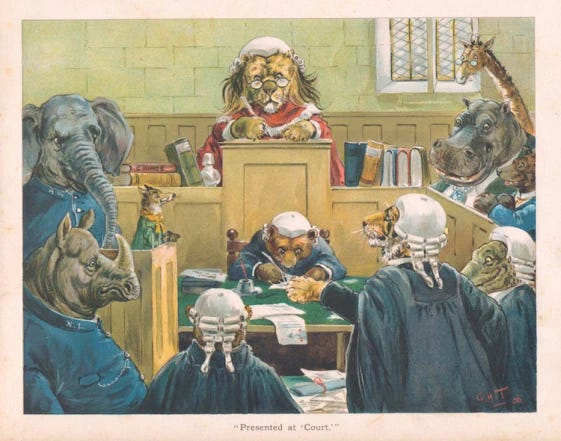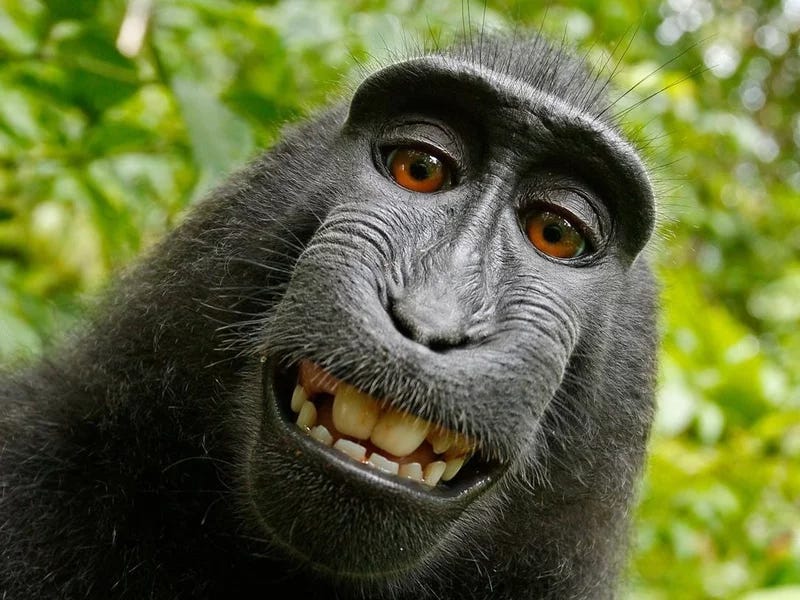If Animals could talk
Colin the chicken had severe depression.
I was once the auctioneer at the Auckland fish market, and I spent a lot of time talking to fish. I would inspect the quality and grade tonnes of fish every morning, wandering around the chiller talking to myself and taking notes. My boss would sometimes take offence at my description of the Trevally as old and tired, or the Snapper was smelly and a bit shit. My boss would say, “Snapper have feelings too y’know” or his favourite; “Fish are people too Denis.”
My hilarious boss may have been right. Environmental groups are trying to change the legal definition of plants, animals, and places to give them the same rights as humans. And AI technology is being developed to translate the language of animals, to give animals a voice.
Humans have been trying to dominate nature for 300 thousand years. We may have only recently achieved this goal of subjugating the planet and most of its inhabitants but now some of us are beginning to realise that ecocide might not be sustainable.
Bolivia, Uganda, the United States, Canada, Brazil, India, Colombia, Mexico and Northern Ireland all have some recognition of nature in their national laws recognising the rights of ecosystems or rivers. The Los Cedros cloud forest in northern Ecuador is recognised as an entity possessing legal personhood and rights. This landmark ruling by the constitutional court put a stop to gold and copper mines.
New Zealand passed the Te Urewera Act in 2014. A former national park that is the home of the Tūhoe people was declared a legal entity, and the Te Awa Tupua (Whanganui River Claims Settlement) Act of 2017 states that the river “is a legal person and has all the rights, powers, duties, and liabilities of a legal person.” If someone drowned in the river I wonder if the river could be guilty of manslaughter? I’m sure the Whanganui River would have good lawyers.
The legal rulings are to protect these areas from farming, mining, and exploitation to make sure they will flourish for centuries to come. The law will protect the land but not the creatures that may be living there. Animals and human legal systems have had a long and complicated history. In centuries past animals were quite frequently put on trial in medieval court cases. Most were found guilty of offences such as murder and assault.
1386 - A sow and her piglets were put on trial for murdering a French child. The mother pig was brought to court dressed in human clothes, she and her whole family were found guilty. Although the mother was executed, her piglets were granted leniency due to their youth and vulnerability.
1474 – An evil rooster laid an egg in Switzerland. This unnatural crime led to the death sentence, and the poor rooster was publicly burnt alive in front of a large crowd of chanting peasants.
1750 - Donkey accused of having sex with a man in France. After a lengthy court battle, it was found that the donkey did not participate voluntarily, and she was acquitted on that basis. The man was sentenced to death.
In 2015, PETA filed a lawsuit on behalf of a monkey who had taken a selfie. The photographer who owned the camera set it up and left it for Naruto, an anonymous Indonesian Macaque, to take this great picture that went viral. The judge had to decide who owned the images Naruto took, the monkey or the man? He ruled in favour of the man saying copyright law did not extend to animals.
Pets have become involved in court battles, and in some cases even had their own legal representation. In custody cases, judges have to consider the best interests of the pet and which home would be better. In the eyes of the law, pets are still considered property. No different from a couch or a car but this doesn’t mean they can’t benefit from an inheritance.
German Countess Karlotta Libenstein left her entire $80 million fortune to her German Shepherd, Gunther the third. Gunther’s fortune has since increased to $375 million through wise investments, making him the richest pet of all time. Gunther bought Madonna's Miami Beach mansion in 2000.
Oprah has five dogs: Luke, Layla, Sadie, Sunny, and Lauren. If they outlive their owner, they will be well taken care of. Oprah has set aside $30 million to care for her beloved canines.
Miles Blackwell was a publishing magnate. When he died in 2001, he left $15 million to his pet chicken named Gigoo.
Pets are part of the family but the argument for individual rights of pets to be the same as humans could be problematic. If pets are people, then we can't buy or sell them and we can't spay or neuter them if it's against their will. And I imagine most pets might not be that keen on getting spayed although I haven’t actually asked any.
All animals can communicate, and if they are to have rights like humans then their voices need to be heard. Imagine if you had a translator app on your phone for your dog. What would he say? Or your budgie or pet chicken? This will happen soon as AI is being developed to translate animal language which will revolutionize our relationship with animals.
Technology like this could spell the end for the murderous mega-farms and the meat industry in general. Imagine if your translator app gave cows a chance to voice their opinion in English about impending slaughter. Journalists interviewing sheep before a trip to the abattoir. Would you be just as keen to devour a delicious roast chicken if you knew his name was Colin and he had severe depression before he was diced for your dinner?
Humanity relies on our suffering planet for sustenance but hopefully technology can also help us create a sustainable and healthy future with enough food for everyone. Maybe there will come a time when all our meat protein is cultured from animal cells in test tubes. And hydroponically grown fruit and vege from indoor vertical gardens. Would this ever be enough to feed the huge population of Earthlings while leaving the wilderness to be wild? I really hope so.
The agricultural industry contributes significant amounts of carbon and methane to the atmosphere, and we will have to change our eating habits to reduce this. Being able to listen to what animals have to say might help us get there a lot faster.
Domestic animals and wild animals are not human. Even if we could communicate with them and understand them, they probably wouldn’t be able to understand us, and we have no idea if they could comprehend the notion of legal rights and status that’s been given to them.
The philosopher Noam Chomsky argued that animals do not have an innate understanding of grammar. Project Nim attempted to prove otherwise. 1970’s New York, a family raised a chimpanzee called Nim Chimpsky in their house, attempting to prove that chimps are capable of grammatically structured sign language and had a sense of morality. But after two years Nim was removed from his surrogate parents due to behavioural difficulties and the project was abandoned.
The question of sentience in both animals and humans is problematic. Do you need a certain level of consciousness to have rights? How smart is an ecosystem? Every human supposedly has equal rights regardless of their IQ, but it could be argued that Octopuses with their brain distribution are smarter than most humans. I think certain large demographic groups of humans are actually growing less intelligent due to rampant disinformation and many sentient animals, such as whales, cats, pigs and bears might be smarter. I recently met a care dog that could sense rising blood pressure and tension and would comfort its owner by lying on her to prevent a seizure.
If animals could talk, and have the same rights as humans, does this blur the lines between species and bring us closer together? Furry fandom has been around since the 1970’s and this issue is already the next vector of outrage and hatred for the anti-vax, anti-trans, anti-woke brigade who promoted and distributed the fake news of teenagers identifying as cats.
We could remove ourselves from nature altogether by building sustainable cities like The Line and leaving the rest of the planet to natural rewilding. Or we could get more involved with nature and closer to Earth’s creatures, building a symbiotic relationship of mutual cooperation. Each direction has its positives and negatives. Soon, we will be able to ask the animals what they think.






I was just reading an article in Scientific American that included a paragraph on The ethics of talking to animals. "Commercial industries could use Al for precision fishing by listening for schools of target species or their predators; poachers could deploy these techniques to locate endangered animals and impersonate their calls to lure them closer. For animals such as humpback whales, whose mysterious songs can spread across oceans with remarkable speed, the creation of a synthetic song could inject a viral meme into the world's population with unknown social consequences."